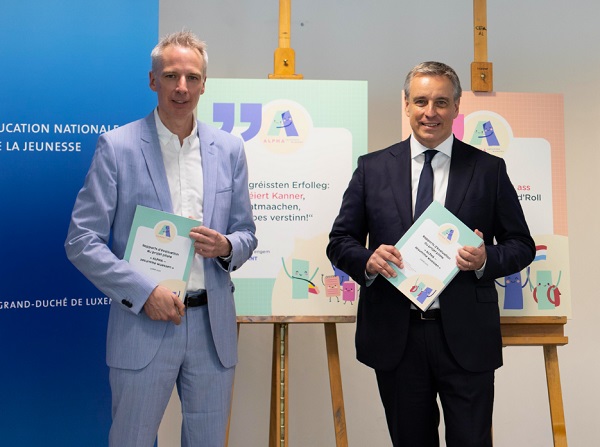 (L-R) Luc Weis, Director of SCRIPT; Claude Meisch, Luxembourg's Minister of Education, Children and Youth;
Credit: MENJE
(L-R) Luc Weis, Director of SCRIPT; Claude Meisch, Luxembourg's Minister of Education, Children and Youth;
Credit: MENJE
On Friday 11 July 2025, Luxembourg's Minister of Education, Children and Youth, Claude Meisch, presented the key findings from the evaluation reports of the "ALPHA – Zesumme Wuessen" project, in the presence of the authors who contributed to their development.
The Ministry of Education, Children and Youth noted that studies on the Luxembourg school system have consistently shown that students who speak neither Luxembourgish nor German at home generally perform worse academically from the start of their schooling. Currently, more than two-thirds of students speak neither language at home. Disadvantaged by literacy in German, these students have lower chances of success from the outset, according to the ministry.
Over the past three years, the parents of 144 pupils in four pilot primary schools located in Differdange, Dudelange, Larochette and Schifflange were given the option to choose whether their child learns to read, write and calculate in German or French. These pilot schools were closely monitored and supported to identify the conditions under which this choice of literacy language could be rolled out nationwide.
A comprehensive evaluation is now available, based on observations from a scientific advisory board, the University of Luxembourg, regional directorates, teaching staff, parents and students. It includes clear recommendations based on qualitative analyses from different perspectives, supplemented by an initial quantitative summary of Cycle 2 extensions.
This evaluation addressed key questions: Were the main objectives of the pilot project achieved? Do students actually learn to read, write and calculate better when instructed in a language closer to their family language? From an organisational perspective, is it feasible for students, literate in two different languages, to be taught together in the same class for other subjects, and thus "grow together"? Can the role of the Luxembourgish language be strengthened in this context?
According to the ministry, all stakeholders agreed that the approach is the right one to achieve the project's ambitions. They recommended the widespread implementation of "ALPHA – zesumme wuessen". Although the choice of language for literacy instruction does not address every need - given some students' complex multilingual environments - it takes into account the growing linguistic diversity in Luxembourg schools and represents a relevant response to the linguistic situation of many students in Luxembourg.
The ministry also highlighted several key measures proposed to support the rollout, including teacher training and the development of suitable teaching materials.
The "ALPHA – zesumme wuessen" project has thus received the green light from the scientific community and all stakeholders involved in the pilot project.
On Friday 11 July, the government approved a preliminary bill that provides for the widespread implementation of "ALPHA – zesumme wuessen" in all primary schools nationwide, starting in the 2026/2027 school year in Cycle 1.2 and progressively extending to other cycles in subsequent years.
Minister Meisch emphasised the significance of this decision: "This is an important step towards greater equality of opportunity for all students and towards a school system that takes into account the diversity of the population."








